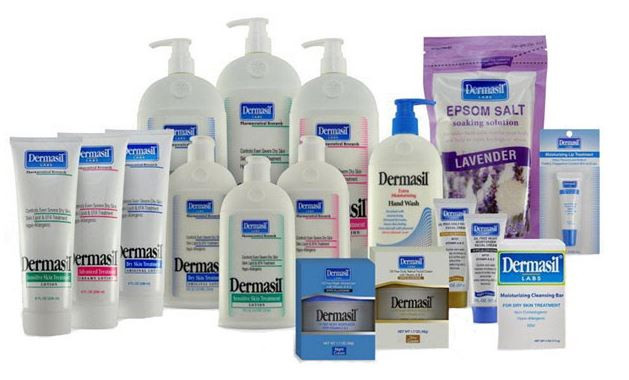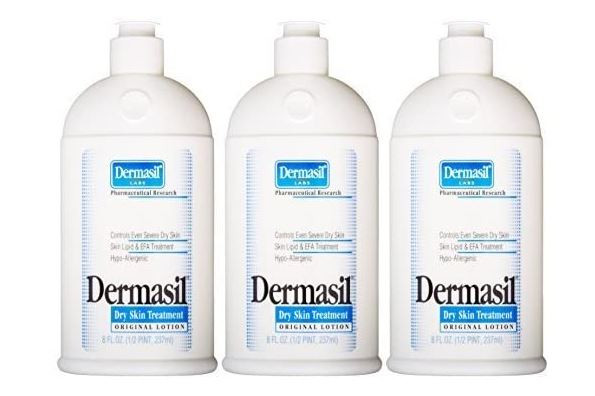Can You Use Dermasil On A New Tattoo? Yes, Dermasil can be a great option for tattoo aftercare, offering moisturizing and protective benefits without irritating the skin, as recommended by many tattoo artists. At tattooat.com, we understand the importance of proper tattoo aftercare for maintaining vibrant artwork and healthy skin. Explore this guide to understand how Dermasil can help you achieve the best results, ensuring your tattoo heals beautifully with the right tattoo lotion and tattoo balm, while understanding the importance of aftercare ointment.
1. What Exactly is Dermasil?
Dermasil is a well-known line of skincare products designed to hydrate and nourish the skin. The range includes lotions, creams, soaps, and oils suitable for all skin types due to their gentle formulations. Importantly, Dermasil products are formulated to exclude common skin irritants, making them a popular choice for sensitive skin and tattoo aftercare. For this article, we will focus on Dermasil’s original topical silicone lotion.
 What Is Dermasil
What Is Dermasil
2. Is Dermasil Safe to Use On a New Tattoo?
Yes, using Dermasil on a new tattoo is generally considered safe. It helps keep the tattoo moisturized, which is crucial for preventing infections. Dermasil works by creating a thin, invisible layer on the skin, helping it retain moisture and stay hydrated. According to tattooat.com, many users and artists prefer Dermasil because of its gentle nature, which minimizes the risk of irritation. This is particularly important in the initial healing phase when the skin is most vulnerable.
Dermasil is beneficial for alleviating itching and irritation, common during the tattoo healing process. It also aids in preventing scabbing and scarring, which can compromise the tattoo’s appearance. The primary active ingredient, dimethicone, is recognized for its moisturizing and cleansing properties on tattoos. Dimethicone, also found in products like CeraVe, is a type of silicone that acts as a lubricant and emollient, smoothing and softening the skin.
 Can You Use Dermasil On A Tattoo
Can You Use Dermasil On A Tattoo
Unlike some other lotions, Dermasil typically avoids lanolin, which can sometimes cause adverse reactions. Instead, it contains Acetylated Lanolin Alcohol, a chemically modified version of lanolin with a lower viscosity, making it less likely to cause issues.
3. What Are The Key Ingredients in Dermasil Lotion?
Understanding the ingredients in Dermasil can help you make an informed decision about using it on your new tattoo. Here’s a more detailed look at some of the key inactive ingredients:
3.1. Water
Water is the base ingredient in Dermasil products, crucial for hydrating and nourishing the skin. It provides a foundation for the other ingredients to work effectively, ensuring the lotion spreads easily and absorbs well.
3.2. Glycerin
Glycerin is a humectant, meaning it attracts and retains moisture in the skin. This helps keep the tattooed area hydrated, which is essential for proper healing and preventing dryness.
3.3. Vitamin E
Vitamin E is a powerful antioxidant that protects the skin from free radical damage. It supports the healing process and helps keep the skin healthy.
3.4. Other Ingredients
| Ingredient | Purpose |
|---|---|
| Petrolatum | Acts as a skin protectant, helping to lock in moisture and create a barrier against irritants. |
| Dimethicone | Provides a smooth, protective layer on the skin, preventing moisture loss. |
| Acetylated Lanolin Alcohol | An emollient that helps to soften and condition the skin, reducing dryness and promoting healing. |
| Mineral Oil | Helps to keep the skin hydrated by forming a barrier that prevents water from evaporating. |
| Cetyl Alcohol | An emulsifier that helps to blend water and oil-based ingredients, creating a smooth texture. |
| Stearyl Alcohol | Similar to cetyl alcohol, it helps to emulsify and stabilize the lotion. |
| Diazolidinyl Urea | A preservative that prevents the growth of bacteria and fungi in the product. |
| Methylparaben | Another preservative that helps to extend the shelf life of the lotion. |
| Propylparaben | Used as a preservative to prevent the growth of mold and bacteria. |
This ingredient list ensures that Dermasil keeps your tattoo moisturized and protected.
4. What Are The Potential Risks of Using Dermasil On Tattoos?
While Dermasil is generally safe, there are a few potential risks to consider when using it on tattoos, mainly due to the presence of petroleum jelly.
Petroleum jelly creates a barrier on the skin, locking in moisture but also preventing the skin from breathing properly. While this can be beneficial for very dry skin, it can also trap moisture and bacteria, potentially leading to infections if the tattooed area is not kept clean.
Because of this, it’s often recommended to use Dermasil after the initial healing phase, once the fresh tattoo has begun to heal, typically after a couple of days.
5. Dermasil vs. Other Tattoo Aftercare Products
When it comes to tattoo aftercare, there are numerous products available, each with its own set of benefits and drawbacks. Understanding how Dermasil compares to other popular options can help you make an informed decision based on your skin type, tattoo placement, and personal preferences.
5.1. Dermasil vs. Aquaphor
Aquaphor is a commonly recommended tattoo aftercare product known for its occlusive properties, meaning it creates a protective barrier on the skin to lock in moisture. While this can be beneficial for preventing dryness and promoting healing, it can also trap moisture and bacteria if the area is not kept clean. According to tattooat.com, Aquaphor is best used in thin layers to avoid suffocating the skin.
| Feature | Dermasil | Aquaphor |
|---|---|---|
| Key Ingredients | Dimethicone, Glycerin, Vitamin E | Petrolatum, Lanolin Alcohol, Glycerin |
| Texture | Lightweight, non-greasy | Thick, occlusive |
| Benefits | Moisturizes without clogging pores, reduces itching and irritation | Creates a strong protective barrier, promotes healing |
| Potential Risks | May not provide enough protection for very dry skin | Can trap moisture and bacteria if not applied properly |
| Best For | Normal to slightly dry skin, tattoos in less exposed areas | Dry to very dry skin, tattoos in highly exposed areas |
| User Preference | Preferred by those who want a lighter lotion that absorbs quickly | Preferred by those who need intense moisture and protection |
5.2. Dermasil vs. CeraVe
CeraVe is another popular option often recommended by dermatologists. It contains ceramides, which help to restore the skin’s natural barrier, and hyaluronic acid, which attracts and retains moisture. CeraVe is known for being gentle and non-irritating, making it suitable for sensitive skin.
| Feature | Dermasil | CeraVe |
|---|---|---|
| Key Ingredients | Dimethicone, Glycerin, Vitamin E | Ceramides, Hyaluronic Acid, Glycerin |
| Texture | Lightweight, non-greasy | Creamy, absorbs well |
| Benefits | Moisturizes and protects without irritation | Restores skin barrier, provides long-lasting hydration |
| Potential Risks | May not be as effective for severely dry skin | Some formulations may contain ingredients that could cause sensitivity in certain individuals |
| Best For | Normal to slightly dry skin, tattoos that need gentle care | Normal to dry skin, tattoos that need barrier repair |
| User Preference | Preferred by those who want a simple, effective lotion with minimal ingredients | Preferred by those who need extra hydration and barrier support |
5.3. Dermasil vs. Tattoo-Specific Aftercare Products
Many companies offer products specifically designed for tattoo aftercare, often containing ingredients like shea butter, coconut oil, and vitamins. These products are formulated to support the healing process and maintain the vibrancy of the tattoo.
| Feature | Dermasil | Tattoo-Specific Aftercare Products |
|---|---|---|
| Key Ingredients | Dimethicone, Glycerin, Vitamin E | Shea Butter, Coconut Oil, Vitamins |
| Texture | Lightweight, non-greasy | Varies depending on the product (lotions, balms, ointments) |
| Benefits | Moisturizes and protects without irritation | Supports healing, maintains tattoo vibrancy, often contains soothing ingredients |
| Potential Risks | May not provide specialized care for tattoo healing | Some ingredients may cause allergic reactions in sensitive individuals |
| Best For | Normal to slightly dry skin, those looking for a simple and affordable option | All skin types, those wanting specialized tattoo care |
| User Preference | Preferred by those who want a widely available and budget-friendly option | Preferred by those who want products specifically formulated for tattoo aftercare |
According to research from Portland State University’s Art Department, in July 2025, tattoo-specific products often provide enhanced benefits due to their specialized formulations.
6. How to Use Dermasil on a New Tattoo
To ensure you get the most out of Dermasil for your new tattoo, follow these steps:
- Wash Your Hands: Before touching your tattoo, wash your hands thoroughly with soap and water to prevent infection.
- Gently Clean the Tattoo: Use a mild, fragrance-free soap to gently clean the tattooed area. Rinse with lukewarm water and pat dry with a clean paper towel.
- Apply a Thin Layer of Dermasil: Apply a thin layer of Dermasil to the tattoo, ensuring it is evenly distributed. Do not over-apply, as this can trap moisture and bacteria.
- Repeat as Needed: Repeat this process 2-3 times a day, or as needed, to keep the tattoo moisturized.
- Avoid Over-Moisturizing: Be careful not to over-moisturize the tattoo. The skin should feel hydrated but not soggy.
7. What Should You Avoid When Using Dermasil on a Tattoo?
To ensure the best results and avoid potential issues, here are some things to avoid when using Dermasil on a new tattoo:
- Avoid Over-Application: Applying too much Dermasil can trap moisture and bacteria, leading to infection. Use only a thin layer.
- Avoid Scented Products: Scented lotions can irritate the skin and cause allergic reactions. Stick to fragrance-free options.
- Avoid Sun Exposure: Keep your tattoo protected from the sun, as UV rays can fade the ink and damage the skin. Use sunscreen specifically designed for tattoos.
- Avoid Tight Clothing: Wear loose-fitting clothing to allow the tattoo to breathe and prevent friction, which can cause irritation and delay healing.
8. What Are Some Expert Tips for Tattoo Aftercare?
Proper aftercare is crucial for ensuring your tattoo heals well and looks its best. Here are some expert tips from tattoo artists and dermatologists:
- Keep the Tattoo Clean: Gently wash the tattoo with a mild, fragrance-free soap 2-3 times a day to remove bacteria and debris.
- Stay Hydrated: Drink plenty of water to keep your skin hydrated from the inside out.
- Avoid Picking or Scratching: It’s normal for tattoos to itch during the healing process, but avoid picking or scratching, as this can damage the skin and lead to infection.
- Follow Your Artist’s Instructions: Always follow the specific aftercare instructions provided by your tattoo artist, as they know what’s best for their work.
9. Understanding Different Skin Types and Dermasil Use
Different skin types can react differently to Dermasil. Here’s how to adjust your approach based on your skin type:
9.1. Dry Skin
If you have dry skin, Dermasil can be a good option for keeping your tattoo moisturized. However, you may need to apply it more frequently to prevent dryness. Consider using a thicker balm or ointment in addition to Dermasil for extra hydration.
9.2. Oily Skin
If you have oily skin, use Dermasil sparingly to avoid clogging pores. Apply a very thin layer and monitor your skin for any signs of breakouts. You might prefer a lighter, water-based lotion instead.
9.3. Sensitive Skin
If you have sensitive skin, Dermasil’s gentle formula can be beneficial. However, always do a patch test before applying it to your entire tattoo to ensure you don’t have any adverse reactions.
9.4. Combination Skin
If you have combination skin, adjust your Dermasil application based on the specific areas of your tattoo. Use a slightly thicker layer on drier areas and a thinner layer on oilier areas.
10. FAQs About Using Dermasil On New Tattoos
10.1. Can You Use Dimethicone on Tattoos?
Yes, dimethicone is often used on tattoos. It acts as a barrier, locking in moisture without clogging pores, making it a common ingredient in tattoo aftercare products.
10.2. Is Lanolin Safe for Tattoos?
Yes, lanolin is generally safe, but with caveats. It’s a natural emollient from sheep’s wool, known for moisturizing. It keeps new tattoos moist during healing, but can cause allergic reactions in some. If you’re sensitive, monitor for any adverse effects.
10.3. What Lotion is Good for Tattoos?
A fragrance-free, alcohol-free moisturizing lotion is ideal for tattoo aftercare, keeping skin hydrated without irritation or allergic reactions. Look for ingredients like ceramides or essential fatty acids to support skin barrier repair and retain moisture. Brands like Aquaphor and Aveeno are commonly recommended by tattoo artists for their gentle, effective formulas.
10.4. How Often Should I Apply Dermasil to My New Tattoo?
Apply Dermasil 2-3 times a day, or as needed, to keep the tattoo moisturized. Avoid over-application to prevent trapping moisture and bacteria.
10.5. Can I Use Dermasil on Old Tattoos?
Yes, Dermasil can be used on old tattoos to keep the skin hydrated and the ink looking vibrant.
10.6. What Are the Signs of an Infected Tattoo?
Signs of an infected tattoo include redness, swelling, pain, pus or discharge, and fever. If you experience any of these symptoms, seek medical attention immediately.
10.7. Can I Use Sunscreen Over Dermasil on My Tattoo?
Yes, you can use sunscreen over Dermasil. Apply Dermasil first, let it absorb, and then apply a tattoo-specific sunscreen to protect the tattoo from UV rays.
10.8. Is It Normal for My Tattoo to Itch When Using Dermasil?
Itching is common during the healing process, but Dermasil should help reduce it. If the itching is severe or accompanied by other symptoms, consult your tattoo artist or a healthcare professional.
10.9. Can I Use Dermasil on All Types of Tattoos?
Dermasil is generally safe for all types of tattoos, but it’s always best to consult with your tattoo artist for personalized advice.
10.10. Where Can I Buy Dermasil?
Dermasil is widely available at drugstores, supermarkets, and online retailers.
Conclusion
Dermasil is a viable option for tattoo aftercare, offering moisturizing and protective benefits. While it might not be the perfect solution for everyone, its gentle formula and hydrating properties make it a popular choice. As always, consult with your tattoo artist for personalized advice and follow a consistent aftercare routine to ensure your tattoo heals beautifully.
Looking for more inspiration, artist recommendations, and aftercare tips? Visit tattooat.com to explore a world of tattoo designs, find talented artists, and learn everything you need to know about tattoo culture and care.
Address: 1825 SW Broadway, Portland, OR 97201, United States
Phone: +1 (503) 725-3000
Website: tattooat.com

